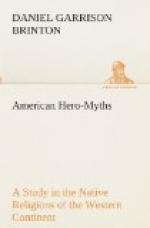[Footnote 1: This transformation is well set forth in Mr. Charles Francis Keary’s Outlines of Primitive Belief Among the Indo-European Races (London, 1882), chaps, iv, vii. He observes: “The wind is a far more physical and less abstract conception than the sky or heaven; it is also a more variable phenomenon; and by reason of both these recommendations the wind-god superseded the older Dyaus. * * * Just as the chief god of Greece, having descended to be a divinity of storm, was not content to remain only that, but grew again to some likeness of the older Dyaus, so Odhinn came to absorb almost all the qualities which belong of right to a higher god. Yet he did this without putting off his proper nature. He was the heaven as well as the wind; he was the All-father, embracing all the earth and looking down upon mankind.”]
In almost every known religion the bird is taken as a symbol of the sky, the clouds and the winds. It is not surprising, therefore, to find that by the Algonkins birds were considered, especially singing birds, as peculiarly sacred to Michabo. He was their father and protector. He himself sent forth the east wind from his home at the sun-rising; but he appointed an owl to create the north wind, which blows from the realms of darkness and cold; while that which is wafted from the sunny south is sent by the butterfly.[1]
[Footnote 1: H.R. Schoolcraft, Algic Researches, Vol. i, p. 216. Indian Tribes, Vol. v, p. 420.]
Michabo was thus at times the god of light, at others of the winds, and as these are the rain-bringers, he was also at times spoken of as the god of waters. He was said to have scooped out the basins of the lakes and to have built the cataracts in the rivers, so that there should be fish preserves and beaver dams.[1]
[Footnote 1: “Michabou, le Dieu des Eaux,” etc. Charlevoix, Journal Historique, p. 281 (Paris, 1721).]
In his capacity as teacher and instructor, it was he who had pointed out to the ancestors of the Indians the roots and plants which are fit for food, and which are of value as medicine; he gave them fire, and recommended them never to allow it to become wholly extinguished in their villages; the sacred rites of what is called the meday or ordinary religious ceremonial were defined and taught by him; the maize was his gift, and the pleasant art of smoking was his invention.[1]
[Footnote 1: John Tanner, Narrative of Captivity and Adventure, p. 351. Schoolcraft, Indian Tribes, Vol. v, p. 420, etc.]




